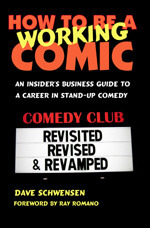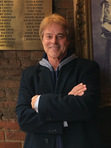Dave Schwensen's Blog, page 25
February 9, 2014
February 9, 1964
I was taken by complete surprise. Well, almost.
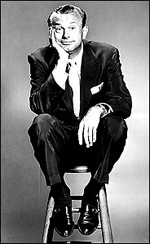
Jack Parr
I had heard of The Beatles before February 9th only because my mom let me stay up late the night Jack Parr aired a brief clip during The Tonight Show on January 3, 1964. It had to be a Friday night and not a school night, but I’m not sure. And it wasn’t because we knew The Beatles were going to be on. Again, I had never even heard of them. We just enjoyed watching Jack Parr. For me it was his sense of smug humor (for lack of a better ter...
February 3, 2014
Don’t reveal too much in your promo material
Hey Dave – I took your workshop about a year ago. When you did the session about business you talked about not putting your home address on your promotional material. Another comic told me I should put my address on my website, promo material and DVD’s if I’m serious about doing this. He said to give bookers every way possible to find me to hire me. What do you think?- E.H.
Hey E.H. – I think you need to hang out with different comics. Of course it’s good business sense to give talent bookers the best and easiest ways to contact you, but let’s not get too personal. When you’re promoting your business – which is you when you’re a comedian or humorous speaker – you have to network and let buyers (in our case meaning the people hiring you) know how to find you.
 But it’s also important to realize it’s pretty much impossible to pick and choose who will end up viewing your promo material.
But it’s also important to realize it’s pretty much impossible to pick and choose who will end up viewing your promo material.
Everything you post online or even post through the Postal Service (sometimes I embarrass myself with this word play) is fair game for just about anyone to see. So not only will talent bookers have a way to find you – so will everyone else.
As usual, I have a story about this. And I’ll share it with you – in a moment…
First of all, business methods have changed a LOT over the past few years for both comedians and humorous speakers. It wasn’t that long ago during my comedy workshops that I’d bring in a stack of promotional packages developed by big-name public relations firms for big-name comedians such as Ray Romano, George Carlin, Bill Cosby, Ellen DeGeneres and others. These were great examples of how professional promotional packages should look, but you really don’t see these much anymore because just about everything today is done online.
—————————————————–
How To Be A Working Corporate Comedian
An 8-week online course – CLICK HERE for details
—————————————————–
In the “old days” these were hard copies (paper and photos) displayed in designer folders or even plain two-pocket versions (like you probably used in school) that agents, managers and talent bookers could actually hold in their hands or spread out on their desks to read. Just the memory of sorting through stacks of folders and photos is making me feel ancient…
BUT now with this information online, I haven’t received a hard copy promo package in… well, since everyone realized it was cheaper, faster and easier to have all this information on a website or attached to an email. It’s all online, easy to view, and the modern way of doing business.
 BUT just like in the old days, you never know who will find this information. If you include a home address or home phone number, any wacko can find you. That’s why I suggest never sharing too much personal information on your promotional material.
BUT just like in the old days, you never know who will find this information. If you include a home address or home phone number, any wacko can find you. That’s why I suggest never sharing too much personal information on your promotional material.
Don’t worry, I’m getting to the story…
BUT first, think about this. The only time someone in this business really needs your address is when they’re sending you a contract or payment. If they want to know where you’re located to see if a specific booking is do-able for both of you – give them the nearest city. Could be New York, Cleveland, Chicago, Los Angeles, etc… That’s all they need to know. When they’re sending contracts or money, then give them an address.
BUT since you’re a business (correct?) I suggest having a business address. And if you need to, think about this. If you work with an agent, they have your contracts and payments sent to their business and not their home address. You need to think the same way. And unless you have a separate business office, use a Post Office Box instead of your home address.
I know with cell phones it’s always convenient to give out that number for important contacts and potential bookings. That’s why answering services for performers are going out of business because no one is far from their phone anymore. But think twice before you share that number online. Unless its a phone dedicated strictly for business, anyone can find your personal number online and make a call. And I’m not just talking about past annoying ex-friends, employers or relationships, but also the wacko looking online for someone to talk to – and annoy.
Besides, it’s much easier for someone to contact you (for bookings and not always annoyances) by clicking an email link through your website. Websites and other online marketing tools should all include your email. And since it’s easy to have separate business and personal email addresses, keep your business and personal emails separate.
For instance, mine is dave@thecomedybook.com. I can tell you that because it’s for business. You don’t really think my family uses that address to contact me – do you? They have my personal email address – and you don’t.
And now to wrap this all up, here’s the story I promised. It will give you a good reason why this all makes good business sense. And as some comedians and humorous speakers like to say, this is a true story…
—————————————————————-
Sign up now through this LINK for Dave’s free weekly newsletter and receive 15% off the Amazon.com list price for How To Be A Working Comic!
—————————————————————-
I received a call from the owner of a well known comedy club who suggested I look at a young, up-and-coming female comedian who needed a manager. I met with her, watched her set at the club that night and knew she was really talented and had potential to make it big.
In the years since, that prediction came true. You would know her as a national headliner and from television and movies if I mentioned her name. But even if she said it was okay, I wouldn’t. She went through enough grief from being too personal on her promo material during the early stages of her career and I don’t want to focus attention on her again in that light.
As I said, you never know what wackos are reading…
Anyway, she wanted to make sure every booker in North America could easily find her, so her home address and home (pre-cell) phone number were plastered all over her (hard copy) promotional material. It worked and she was booked for a week at a great comedy club only a few hours drive from where she lived. It was a big career break and she was psyched. But she was about to learn how much she really didn’t know about this crazy business.
Oh, and I need to mention one other thing. She is very attractive and her promotional pictures, (headshots), proved that. The club had her photo on display with the headliner’s outside the club – and you don’t usually see that happen for an opening act.
When she finished her week’s booking on Sunday night, the club owner took her into the office and paid her. Then he threw her promo material in the garbage can. When she asked why he said it had nothing to do with her performances. She was funny and he planned to bring her back. But he also knew it’s important for performers to keep their promo updated and next time she was booked she should send him a new resume, bio and headshot. Most bookers did this because they just didn’t have the file, desk or floor space to keep everything they received.
A few days later the comedian received a call from another “booker” who said he had her promo material. You know where I’m going with this… right?
 Turns out it wasn’t really a booker, but a wacko comedian who had been hanging around the club. He had seen her photo on display and then in the garbage – with her home phone and address on it – and taken it. After a few more calls it started to get weird and then scary when he became a full-blown stalker.
Turns out it wasn’t really a booker, but a wacko comedian who had been hanging around the club. He had seen her photo on display and then in the garbage – with her home phone and address on it – and taken it. After a few more calls it started to get weird and then scary when he became a full-blown stalker.
Our female comedian was learning a tough lesson the hard way and not only had to destroy all her promotional material, (back in the days when copying headshots was expensive), but had to order everything printed again with a separate business phone and email as the only contact information.
Today it would mean changing the contact info on all your websites and online marketing which doesn’t always work the way you think it will. Web pages seem to have an everlasting life. I can Google and find pages about myself and my business that were posted years ago and extremely outdated. In fact I just did and found a newspaper review I wrote about a Paul McCartney concert back in 2003. I don’t even remember writing it – and it was like reading for the first time. Since I don’t write for that newspaper anymore, the contact email no longer works. But if they’d had my home address with the article…
Now back to the story, because we’re not done yet…
The worst part was that she actually had to move. Imagine how you’d feel when someone wacko and scary can honestly say, “I know where you live.” If it’s not said on a Hollywood movie set, it’s no way to live every single day. She found a new apartment and had some BIG guys not only help her move, but also make sure a certain wacko wasn’t hanging around when they did it.
The lesson is an old one. You have a business, so treat it that way. Keep your personal life and contact information out of it. You never know who’s gonna find it.
——————————————————————————————-
Dave Schwensen is the author of How To Be A Working Comic: An Insider’s Business Guide To A Career In Stand-Up Comedy, Comedy FAQs And Answers: How The Stand-Up Biz Really Works, and Comedy Workshop: Creating & Writing Comedy Material for Comedians & Humorous Speakers.
For details about upcoming comedy workshops at the Chicago and Cleveland Improv Comedy Clubs, and private coaching by phone or via Skype visit www.TheComedyBook.com
NEW – How To Be A Working Corporate Comic an 8-week online coaching program. For information visit this LINK.
For info about this free weekly newsletter visit this LINK.
Copyright 2014 – North Shore Publishing


January 27, 2014
What would you ask a talent booker, agent or manager?
Hola Dave – I’ll make this quick. When meeting a booker, agent or manager for the first time, should there be any questions a comedian should ask that are important to them (them being the booker etc..)? If so, should the questions be different between the three? I ask cause I will be attending The World Series Of Comedy in Vegas this year & turns out it will be loaded with scouts. Thank you señior – A
Hey A – That’s a really good question and I want to throw it back to our readers before tossing in my thoughts. If you have suggestions about questions, please use the contact links below or send a comment through this site and I’ll share them in a future newsletter. Thanks!

The audition process
As I mentioned in a direct reply to A’s email, I’ve mostly been on the other side – as the booker or agent – which means I was the guy who had questions for the comedians (I’ve also worked with speakers, musicians and variety acts). If I couldn’t watch a live showcase in a club, I would review a video and then if still interested, check out the promo – performing credits, letters of recommendation, training, etc… If the performer looked like a good match for particular bookings – for instance, college shows or corporate events – I’d call or email and schedule a time to talk.
This is pretty standard routine. When industry execs (agents, managers and bookers) are thinking about scheduling or representing a comedian for the first time they’ll want to find out who else the comic’s worked for and in what types of venues and what position (opener, feature or headliner). If they’re located in the same city a live showcase can be arranged. But when you’re dealing with distance and regional bookings – for instance the agent is based in Chicago, the performer is in Atlanta and the gig is in Dallas – everyone has to rely on video.
——————————————————————–
Comedy Workshop at The Chicago Improv starts Feb 1st
Includes an evening performance at The Improv on Feb 19th
CLICK HERE for details and to register!
———————————————————————
I also know bookers rely on personal recommendations from other comedians and industry people they’ve worked with and trust. I get calls and emails requesting info about comics I might know or have worked with – and do the same. In fact, I sent an email last night to a friend for any info about a comedian I don’t know, but had contacted me for work. So it does happen. It’s a wide-ranging network when you think about it.
But for you as a comic (or humorous speaker) a lot of your questions can be answered by also networking and researching. If you haven’t heard of the agent or booker, do a Google Search. They’re all on the internet with websites – if they’re legit. See what other comics they represent and what they’re doing (credits).

NOT The Improv bar
- but close enough.
Also network with other working comics and/or speakers. From my experiences, conversations about agents and bookers are pretty common. There are a lot of different opinions and experiences being shared – both good and bad. I always learned a lot about the biz and who’s doing what (good and bad) just by listening to the comics talking around the bar at The Improv.
If I were to suggest any questions, I would ask if there are any specific markets they specialize in. For instance, when I worked in NYC and LA most of the agents I came in contact with worked to get their clients on television and into the good clubs on the road. I know that sounds limited, but they were the two markets I was exposed to as a club booker in those cities.
—————————————————————-
Sign up now through this LINK for Dave’s free weekly newsletter and receive 15% off the Amazon.com list price for How To Be A Working Comic!
—————————————————————-
BUT when I started working in the Midwest, I found agencies I had NEVER even heard of before that were HUGE in the college and corporate markets. I hadn’t encountered them before because my job had me totally focused on the NYC and LA comedy clubs and TV shows.
When I got involved as a college agent (NACA) I talked with the other agents and learned most really had no interest in the NYC and LA comedy scenes. Their bread and butter ($$’s) was booking shows for colleges throughout the country. It was a full time job and the specific market they chose to work in.
So if you wanted to be on television, you would need an agent that focused on that market. If you wanted to do colleges, you’d want a good college agent.
Make sense?
So if you have an opportunity to ask an agent, manager or talent booker any questions, I would suggest learning what markets they work in the most. The big ones can usually do it all. The smaller ones have to focus on where the $$’s are for them.
One bit of advice for a first getting to know you meeting is not to ask about percentages and other contractual details – unless they bring it up first. They will if they’re interested in working with you. Then you can accept, decline or negotiate. But that’s not something you’ll have to deal with at a meet and greet session.
Otherwise, I can’t think of anything specific. The usual deal with meeting these industry people is that they’ll be asking the questions – especially if these are one on one meetings. So just answer honestly and promote yourself without being too aggressive (a pain in the butt – know what I mean?).
However if there is an opportunity to really ask questions, base them on who you are and your career goals.
—————————————————–
How To Be A Working Corporate Comedian
An 8-week online course – CLICK HERE for details
—————————————————–
For instance, since I’ve worked with the comedian who supplied today’s question and realize “Hola” is not in my English Language word finder, he should be interested in knowing if they book any shows or work with other comedians, production companies, etc… in the Latino market. You know as well as I do how HUGE that is. If he was to go with an agent or manager, he MUST (and this is my professional opinion) go with someone who can break him into that specific market as well as English speaking gigs.
And now it’s time for one of my stories…

Al & Rocky
One of my best pals in NYC studied acting at The University of Miami. One of his classmates (his best friend!) is an actor named Rocky Echevarria, who is Cuban and bilingual. Right after graduating Rocky had a decent career working in Spanish speaking television shows, but his agent knew he was talented enough to also work in the English speaking market and put his focus in that direction. He changed his name to Steven Bauer and scored the part of Manny in the classic film Scarface with Al Pacino and earned an Academy Award nomination.
I’m not saying he couldn’t have done it with a different agent. But if had gone with an agent that only focused on the Latino market and Spanish speaking roles, my best pal (the guy at the beginning of this long story) might have had a better chance of being cast as Manny than Rocky (Steven) did. You never know.
The point is if you have an opportunity to really talk and ask questions with industry execs, find out specifically what they can offer you at this stage in your career and in the future. It could be a good fit – or it may not. But you’ll never know if you don’t ask.
Question suggestions? Please use the comment link below or email to dave@thecomedybook.com – thanks!
——————————————————————————————-
Dave Schwensen is the author of How To Be A Working Comic: An Insider’s Business Guide To A Career In Stand-Up Comedy, Comedy FAQs And Answers: How The Stand-Up Biz Really Works, and Comedy Workshop: Creating & Writing Comedy Material for Comedians & Humorous Speakers.
For details about upcoming comedy workshops at the Chicago Improv (beginning February 1, 2014 – visit this LINK) and Cleveland Improv Comedy Clubs, and private coaching by phone or via Skype visit www.TheComedyBook.com
NEW – How To Be A Working Corporate Comic an 8-week online coaching program. For information visit this LINK.
For info about this free weekly newsletter visit this LINK.
Copyright 2014 – North Shore Publishing


January 26, 2014
Time Waits For No One – Top 3 Forever Out-Dated Classic Rock Songs
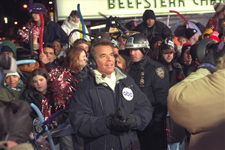
America’s favorite teenager
We’ve had almost a month since wishing Dick Clark was still around to ring in the New Year. But even with all that time, I know there are more than a few of you living in the past and still writing “2013″ on your checks. Then if you’re like most classic rockers maintaining a Keith Moon mentality, you go berserk-o over your annual mistake, trash (tear up) the check and say a few choice words that would get you banned for life on network television – but make you a...
<!--[if gte mso 9]>January 21, 2014
Promoting your videos on YouTube
Hey Dave – How can I promote my YouTube videos? – BT
Hey BT – The business of promoting comedians has changed from just a few years ago. Almost everything today is done online. There are still a few agents and bookers who request hard-copies of promotional packages, but in my opinion it just means they’re really out of touch with what’s going on. If they can’t get online and learn how to work with video and website links, what kind of gigs are they getting for their clients? I’m guessing Amish barn-raisers…
 What used to be included in a hard-copy promotional package is what still needs to be included when you promote yourself online. If you want to know what’s required, pick up a copy of my book How To Be A Working Comic (there’s a link below for the updated edition). All the marketing tools that were once in hard copy promo packs are now posted online. A personal website is considered more professional and required by some bookers I’ve worked with if you even want to be considered for work. And it’s not all that pricy if you look into some of the blogging options like a website on WordPress.
What used to be included in a hard-copy promotional package is what still needs to be included when you promote yourself online. If you want to know what’s required, pick up a copy of my book How To Be A Working Comic (there’s a link below for the updated edition). All the marketing tools that were once in hard copy promo packs are now posted online. A personal website is considered more professional and required by some bookers I’ve worked with if you even want to be considered for work. And it’s not all that pricy if you look into some of the blogging options like a website on WordPress.
———————————————————————————
Sign up now through this LINK for Dave’s free weekly newsletter and receive 15% off the Amazon.com list price for How To Be A Working Comic!
For info and to register for Dave’s comedy workshop at The Chicago Improv beginning February 1, 2014 visit this LINK!!
———————————————————————————
But don’t be discouraged if you don’t have a big time website dedicated strictly to your comedy or speaking career. Facebook will still work with smaller bookers and LinkedIn is growing into a great network / marketing tool. But go for a website as your main landing page when the money starts pouring in from smaller gigs.
Here’s some insider advice:
Great promotional material might get you noticed, but talent and experience are what gets you hired. Basically it’s still all about writing and performing. That part of the job never ends. But when you’re ready to take the next step in your career, you’ve got to let people know – and that’s when professional looking promo material and marketing techniques come into play.
Notice one of the words used above – professional. Here’s one of the most important lines from my book Comedy FAQs And Answers:
“They may call it amateur night – but no one is looking to hire an amateur.”
 Sharing your videos with friends is easy on YouTube. Millions of people do it every day. Just send them a message saying watch my video, and include a link. But when it comes to promoting videos on YouTube to get professional bookings, you need to realize your video and entire website has become an important marketing material.
Sharing your videos with friends is easy on YouTube. Millions of people do it every day. Just send them a message saying watch my video, and include a link. But when it comes to promoting videos on YouTube to get professional bookings, you need to realize your video and entire website has become an important marketing material.
Go back the word I used earlier – professional. Now memorize it.
Once you have a professional looking video and a professional looking website, then you can start contacting bookers to look at it. This is done through networking, (meaning you know someone who can recommend you or put you in contact with the booker), researching, (going to the club’s website and finding the required way to submit promo material or request a showcase), and/or (and I hate this one, even though I’m good at it) cold-calling. With the cold call you basically want to get the correct information on the correct way to contact a booker and then follow it.
Now this is not gonna sound too friendly or supportive, but I have to say it…
To the writer of this question – and don’t get angry because no one else reading this knows who you are – I watched the YouTube link you sent. Here’s some really good advice. Do NOT promote it to comedy bookers. It comes off as being very amateur and could damage your chances of being seen later when you’ve actually gained enough on stage credits and experience to be taken seriously by bookers.
No booker has time, desire, energy or interest in watching really bad amateur videos. Take my advice on this one. Plus it could come back to haunt you.
 I remember a very influential comedy booker when I ran the NYC Improv. I saw a comedian who was GREAT and went to this booker with a GREAT recommendation to hire the act. I was SHOCKED to be told this booker had seen the SAME comedian TEN years earlier when he was just starting his career. Based on that early impression, the booker said the comic was terrible and he had no interest in hiring or even showcasing him again.
I remember a very influential comedy booker when I ran the NYC Improv. I saw a comedian who was GREAT and went to this booker with a GREAT recommendation to hire the act. I was SHOCKED to be told this booker had seen the SAME comedian TEN years earlier when he was just starting his career. Based on that early impression, the booker said the comic was terrible and he had no interest in hiring or even showcasing him again.
Here’s my advice. Don’t worry about promoting yourself for work until you’re ready to be a working comic. Then make it look as if you already are a working comic with a head shot, resume with a decent amount of on stage credits, a short bio so they know something about you, and reliable contact email and/or phone number. You can have all that stuff on a website and in any design or format you want – as long as it’s easy for bookers to review.
BUT the most important part of a promotional package – online or hard copy – is your video. Don’t put out something that makes you look like an amateur just to have a video to submit. Think of the first impression you’re making on a booker and that he/she might remember it.
They may call it amateur night – but no one is looking to hire an amateur.
Professional. Memorize the word and use it when promoting yourself as a working comic.
——————————————————————————————-
Dave Schwensen is the author of How To Be A Working Comic: An Insider’s Business Guide To A Career In Stand-Up Comedy, Comedy FAQs And Answers: How The Stand-Up Biz Really Works, and Comedy Workshop: Creating & Writing Comedy Material for Comedians & Humorous Speakers.
For details about upcoming comedy workshops at the Chicago Improv (beginning February 1, 2014 – visit this LINK) and Cleveland Improv Comedy Clubs, and private coaching by phone or via Skype visit www.TheComedyBook.com
NEW – How To Be A Working Corporate Comic an 8-week online coaching program. For information visit this LINK!
Copyright 2014 – North Shore Publishing
January 19, 2014
#310 – New Girl In School
I wake up with music. It’s all explained in the About Dream Songs link above.
*
#310 – New Girl In School by Jan and Dean
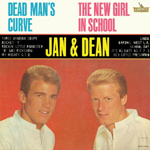
Double sided hit single
Jan and Dean. For my generation in the mid 60′s their names bring back warm Southern California memories of surfing, cars and girls. And those are pretty strong words from a Snow Belt raised Classic Rocker who never even set foot in Southern California until the 1980s.
A close musical relative to The Beach Boys, Jan Berry and Dean Torrence coasted thr...
<!--[if gte mso 9]>January 13, 2014
Motivation for showcases
Dave – What’s the motivation for a talent booker to organize these showcases? What is the benefit to the booker and the club? – MB
Hey MB – Since your email came in not long after last week’s FAQ And Answer was posted, I know you’re referring to my mention of comedy club showcases in Los Angeles (and NYC). Instead of repeating myself, if anyone missed it you can just scroll down to the next article to read.
The motivation to organize a showcase is to find (scout) talent. Talent bookers, casting directors, producers, event planners and anyone else looking to hire comedians or speakers can organize or attend live performances to see for themselves before hiring someone. They also watch videos on the internet or DVDs, but when you’re in one of the big media markets – like LA or NYC – there are more (in my opinion) opportunities to see the performers in person.

Is it live or Memorex?
And you know live is always better – right?
If you don’t believe me, watch your favorite band on a DVD and then check them out in concert. There’s a big difference…
When I worked for The Improv in LA and NYC I would get calls from casting directors looking for certain types (I mentioned this last week). This could be for a movie, television show – or even a one-shot appearance on a late-night talk show.

In 3 minutes you’re done
For instance, when The Tonight Show set up a showcase, they were looking for comics who were (of course) funny and had the needed experience to do a high-profile (pressure is on!) show – which meant there was less of a chance they would freeze up or bomb when they hit the stage in front of the cameras. By scheduling a showcase in the club, they could watch a preselected number of comedians perform in front of a live audience and decide which ones were “ready” for the show. When I was there the comics were usually given about three minutes to prove their stuff.
I also did this with A&E’s An Evening At The Improv. I would watch tons of videos sent in advance, pick ten comics who could be ready to do the show, and schedule them for a Monday night showcase. Each would do three minutes on stage, which meant the showcase would be over in half an hour. There was never a “set number” of who would be booked that night to do the television show because it was an almost weekly process. You might find four or five in one night – and none the next.
But the bottom line is that it was an efficient (for bookers) and fair (for comedians) way to audition performers.
———————————————————————————
Sign up now for Dave’s free weekly newsletter and
receive 15% off the Amazon.com list price!
For info about Dave’s workshop at The Chicago Improv beginning February 1, 2014 visit this LINK!!
———————————————————————————
This is also how it was done for sitcoms, movies and other casting projects. Once when I was at the New York Improv I got a call from The Today Show. It was an election year and they wanted a comic that did political material. I already knew ten from our roster that would be great for the gig, so I called them and scheduled a showcase where they all came in on the same night and did three minutes of political stuff. The producers from The Today Show came to the club, watched the showcase and picked one. It made their job a lot easier than sending out a casting call and sitting through hundreds of videos and then scheduling auditions in their office.
So that would be the motivation for the talent booker.
For an agent or manager, they want their clients seen by the people who can give them work. They would schedule a showcase time, usually thirty minutes to an hour, with the club (in my case The Improv) and fill the spots from their roster of comedians. Then they would invite casting people, talent bookers, etc. to watch the showcase. If it was a manager promoting the showcase, they would also invite agents they wanted to represent their clients.

Got an appointment?
It was a lot of work to make these showcases successful, but again it beat the heck out of sending press packages and making phone calls to set individual appointments. Everyone would be in the same place at same the same time for a big schmooze-fest. In other words a good showcase is a prime networking and “doing business” opportunity.
So what’s the benefit for the booker? Again – an efficient way to find talent.
What’s the benefit for the club? Prestige and more business.
Think about it. If you owned a comedy club and had big-time producers and casting agents from every major network, film studio and agency hanging around scouting talent, every comic will want to perform there. And when you have the best comics on your stage, you get the most business because that’s what audiences want to see – good (funny) comedians. That’s why it’s just as competitive between the clubs to host industry showcases as it is for the comedians who want to be on them.
Showcasing is also beneficial for (humorous) speakers.
When I was an agent in NACA (National Association for Campus Activities) showcasing was the best way to score bookings. I won’t get into all the details on how this works – it’s in my book Comedy FAQs And Answers if you’re interested.

All kinds of performers
But in a nutshell, colleges and universities would send a delegation of Student Activities members to an NACA Conference in their regional area. They would go to various showcases over a few days and watch speakers and comedians (and all kinds of other performers) do twenty minute sets. This is how they would choose which ones they would book for the upcoming school year.
If you wanted to be booked – you pretty much had to be seen. That’s the purpose behind showcases. It’s an efficient and proven way to find talent and show your talent.
——————————————————————————————-
Dave Schwensen is the author of How To Be A Working Comic: An Insider’s Business Guide To A Career In Stand-Up Comedy, Comedy FAQs And Answers: How The Stand-Up Biz Really Works, and Comedy Workshop: Creating & Writing Comedy Material for Comedians & Humorous Speakers.
For details about upcoming comedy workshops at the Chicago Improv (beginning February 1, 2014 – visit this LINK) and Cleveland Improv Comedy Clubs, and private coaching for comedians and speakers by phone or via Skype visit www.TheComedyBook.com or email Dave@TheComedyBook.com
NEW – How To Be A Working Corporate Comic an 8-week online coaching program. For information visit this LINK!
Copyright 2014 – North Shore Publishing


January 8, 2014
#311 – Rock’n Me
I wake up with music. It’s all explained in the About Dream Songs link above.
*
#311 – Rock’n Me by The Steve Miller Band
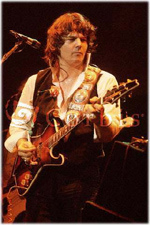
Rock’n Me
Disco or rock? I’m not talking about the song because the title gives away what genre that fits into. I’m talking about the year – 1976.
I remember this as a sort of transition year. My generation of baby boomers were stuck between a rock and a hard place. In other words: rock and disco. Personally I remember Bachman Turner Overdrive (BTO) and The Eagles scoring big h...
January 6, 2014
Breaking down gatekeeper blockades
Hi Dave – No, I’m not a comic. However, I’m a WGA screenwriter with a total focus on comedy screenplays. Can you tell me how to contact comedians’ agents without running into blockades? I mean the blockades typically set up by the gatekeepers of those agents. Best – HK
Hey HK – The bigger the comedian (think celebrity) the bigger the agency blockade will be. When you make a call without prior personal contact or a great reference, plan some extra time for holding, transfers and a final request to leave a voice message and “Someone will get back with you.”
Does anyone really know who that someone is? I doubt it because they rarely call back without the prior contact or reference. And unless you left a voice message with a great pitch (offer) that includes the opportunity for a lot of potential $$$’s (yeah, I’m jaded) you’ll spend a long time sitting by the phone waiting for that return call.
 HK and I traded a couple emails and I remembered a past FAQ And Answer article about dealing with gatekeepers (the person who answers phone calls and forms a human blockade to keep you from speaking directly to an agent or celebrity). I found it’s still posted for August 5, 2013. You can read it by going to the Categories link on the right side of this page and finding gatekeeper.
HK and I traded a couple emails and I remembered a past FAQ And Answer article about dealing with gatekeepers (the person who answers phone calls and forms a human blockade to keep you from speaking directly to an agent or celebrity). I found it’s still posted for August 5, 2013. You can read it by going to the Categories link on the right side of this page and finding gatekeeper.
Except the suggestions in that article are different from the answers you’re looking for with this question since the August 5th article concerned humorous speakers and comedians getting past gatekeepers to book paying gigs. You’re looking to find comedians and agents that would be interested in your screenplay.
But the theory is the same. You have to be SEEN and involved in the SCENE.
I know through experience from working at the LA and NYC Improv clubs (talent coordinator) that a lot of valuable entertainment industry contacts are made by networking. It’s being part of the scene.
Not only did I get to work with many great comedians, but I also met a lot of agents, managers, producers and writers just by being in the clubs during shows. They’d come in to watch the comics, and then socialize (network) in the restaurant or bar areas after the show. Sometimes they were there because the comedians they already represented were performing, or they were looking for new talent.
And believe me, a good agent or manager is always on the lookout for new talent. Some of them may claim to have a full roster and not accepting new clients, but if a performer simply blows them away and the agent or manager sees a good career opportunity for both of them, it’s their job to pursue it. That’s good business sense.
———————————————————————————
Sign up now for Dave’s free weekly newsletter and
receive 15% off the Amazon.com list price!
For info about Dave’s workshop at The Chicago Improv beginning February 1, 2014 visit this LINK!!
———————————————————————————
Now, to get back to today’s question…
I’ve also seen this with producers and writers looking to interest comedians and agents in a particular project. For instance, when I worked in LA I remember getting a LOT of calls from television and film people looking for comics that fit a specific type. The casting call could be for male or female, tall or small, fat or thin, black or white – or for whatever the TV or film part called for. They wanted to know if any comedians fitting the desired type would be performing that night or if we could put together a live showcase (audition) during a future show.
That’s why you can sometimes go to a comedy club in LA or NYC and see a number of comedians in a row who are similar in type and only do a few minutes (3-5 minutes is norm) of material. They’re showcasing (auditioning) for someone in the audience.

Let’s do lunch!
After the showcase you can usually find just about everyone – comics, agents, managers, business execs, etc.. – networking (schmoozing, laughing, pitching, etc…) in the club’s restaurant or bar. Business cards are exchanged and meetings are scheduled based on what happened during the showcase.
The ones selected for these meetings and potential projects should have no problem getting past any gatekeepers. They’ve made a personal contact. That beats the heck out of cold-calling and sitting on hold for a few hours listening to musak.
My point is that the comedians were SEEN because they’ve worked hard at becoming part of the SCENE. They were known by the club booker as someone who fits what the writer, producer or casting person is looking for. That’s why the comics were called in for the showcase. It’s rare (in fact I’ve never seen it happen) that a booker will call in a comedian he’s never seen perform and knows nothing about for an important industry showcase.
It’s the same when you’re looking to hire talent or get them interested in a project such as a screenplay. Quite a few newcomers (amateurs) with stars in their eyes (looking for overnight success) will jump at almost any chance to “Be in a movie!?”
But the professional working comics who’ve been around for awhile will not be so naïve. They understand it’s a business (at least they should). They might listen to a pitch if it’s from a reliable or known source (friends in the biz are always throwing ideas at each other) but if they’re really interested and have they type of decent credits you’d want for a legit movie, they’ll probably have an agent you’ll end up pitching to before any deals are made.
So basically in your case, I’d forget about battling the gatekeepers by cold-calling and scope out the comedians in person who you think would be right for your screenplay. Become a part of the SCENE by going to the clubs and checking out their live performances. You might even discover a comic you’ve never heard of and further discover he’d be perfect for your film.

Pu-u-leeezzz!!!
Warning:
Don’t be too aggressive (as a talent booker, that’s what turned me off the most). But take an opportunity to network after the show. Be professional and don’t come off like a stalker (you know what I mean) when you tell the comic and/or his agent about your project.
If the comedian is interested he can get you past any agency gatekeeper with one phone call requesting his agent talk with you. If you meet the agent and he thinks the script is right for his comedian client, he’ll have his gatekeeper set up a meeting.
Sound too simple? It’s really not and I shouldn’t make it sound that way because there are a LOT of people in the entertainment industry who practice the art of schmoozing. I assume that’s where the phrase, “Let’s do lunch” came from . But remember one thing:
No one would be doing it if it didn’t work.
If you’re already a known name screenwriter with big numbers ($$$’s), then gatekeepers are no problem – you’ll get through. For everyone else (assuming talent and experience are already a “given”) it’s all about networking and contacts. Be part of the SCENE and there’s always a chance you’ll not only be SEEN but also HEARD.
——————————————————————————————-
Dave Schwensen is the author of How To Be A Working Comic: An Insider’s Business Guide To A Career In Stand-Up Comedy, Comedy FAQs And Answers: How The Stand-Up Biz Really Works, and Comedy Workshop: Creating & Writing Comedy Material for Comedians & Humorous Speakers.
For information about these books, upcoming comedy workshops at the Chicago (beginning February 1, 2014 – visit this LINK) and Cleveland Improv Comedy Clubs, and private coaching for comedians and speakers by phone or via Skype visit www.TheComedyBook.com
Copyright 2014 – North Shore Publishing
January 2, 2014
#312 – Rain on the Roof
I wake up with music. It’s all explained in the About Dream Songs link above.
*
#312 – Rain on the Roof by The Lovin’ Spoonful
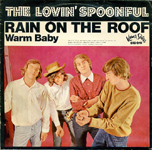 If I was pushed into a corner and had to make a decision, I would pick 1966 as my favorite year in pop music. And if push came to shove and I had to give a reason for my choice it would include much more than just the songs. There are memories and feelings – some great and others I’d wish for a “do-over” – but I think that’s true for many of us who look back on our first...
If I was pushed into a corner and had to make a decision, I would pick 1966 as my favorite year in pop music. And if push came to shove and I had to give a reason for my choice it would include much more than just the songs. There are memories and feelings – some great and others I’d wish for a “do-over” – but I think that’s true for many of us who look back on our first...


